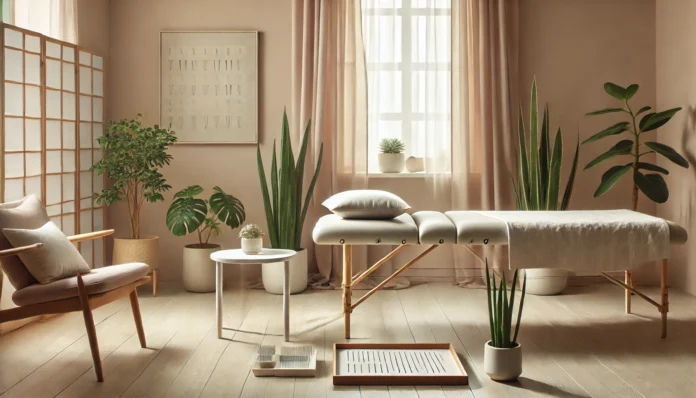Rediscovering Ancient Wisdom in a Stressed-Out Modern World
In a world that’s constantly moving—faster, louder, and more digitally saturated than ever before—stress and anxiety have become nearly universal human experiences. From chronic work-related burnout to the lingering psychological impact of global events, individuals are increasingly turning to alternative therapies to find relief beyond conventional medication. Among the most widely discussed and deeply rooted holistic approaches is acupuncture, an ancient healing practice with origins dating back over 2,000 years. Once relegated to the realm of traditional Chinese medicine, acupuncture has steadily gained traction in the Western world, not only as a tool for pain management but also as a potential remedy for psychological distress.
You may also like: Proven Relaxation Techniques for Stress and Anxiety: Evidence-Based Strategies to Calm Your Mind and Body
As more people explore integrative solutions to support mental wellness, a key question arises: can acupuncture help with stress and anxiety, and if so, how? This article examines the evidence, traditions, and clinical insights surrounding acupuncture for stress and anxiety, offering a clear-eyed perspective on whether this time-honored technique deserves a place in your modern mental health toolkit. Through a thorough exploration of how acupuncture works physiologically and psychologically, we’ll uncover whether it lives up to its promises of relaxation, balance, and long-term emotional resilience.
While the idea of inserting fine needles into the skin may sound intimidating to some, the therapeutic intent of acupuncture is grounded in centuries of observation, evolving theory, and now, increasingly, empirical validation. As we move forward, we’ll dive into both the ancient roots and the modern science behind acupuncture and stress relief, helping you determine whether this ancient practice aligns with your wellness goals and lifestyle.
Understanding Acupuncture: Foundations and Philosophy
Acupuncture is rooted in traditional Chinese medicine (TCM), a holistic system of health that views the body as an interconnected network of energy pathways called meridians. These meridians are believed to carry “qi” (pronounced “chee”), the life force or vital energy that supports physiological and emotional balance. When qi is flowing smoothly, the body and mind are in harmony. But when this energy becomes blocked or stagnant, practitioners of TCM believe it can lead to a host of issues, including physical discomfort, emotional disturbances, and disease.
To restore balance, acupuncture uses ultra-thin, sterile needles inserted into specific points along these meridians. Each acupuncture point corresponds to an organ system or physiological function, and the strategic placement of needles is designed to stimulate the body’s self-healing mechanisms. From this perspective, the practice is not just about symptom relief but about rebalancing the entire organism—emotionally, physically, and energetically.
However, the traditional language of qi and meridians does not always translate seamlessly into Western medical models, leading to some skepticism in scientific circles. Fortunately, contemporary research has begun to bridge this gap. Studies using functional MRI, heart rate variability analysis, and blood cortisol measurements suggest that acupuncture may modulate key neurobiological processes involved in stress and anxiety regulation. These physiological markers offer an empirical foundation that complements traditional theory, making acupuncture and stress reduction a compelling area of interdisciplinary interest.
Moreover, acupuncture’s appeal lies in its adaptability. It can be used as a standalone treatment or as part of an integrative approach alongside therapy, medication, mindfulness, and lifestyle adjustments. As awareness grows around the limitations and side effects of conventional psychiatric drugs, many patients are exploring complementary therapies like acupuncture for relaxation and emotional grounding. The question now is not whether acupuncture is valid, but to what extent it can serve as a meaningful support in the mental wellness journey—and what kind of outcomes individuals can realistically expect.
How Acupuncture Affects the Brain and Body: The Neurobiology of Stress Relief
Understanding how acupuncture supports mental wellness requires diving into the fascinating interplay between the brain, nervous system, and hormonal pathways. While traditional explanations of energy flow and meridians remain integral to Eastern medical philosophy, Western science has made notable strides in uncovering how acupuncture for stress and anxiety works on a physiological level. Increasingly, researchers are discovering that acupuncture stimulates the body’s internal systems in ways that have measurable effects on mood, cognition, and physical relaxation.
At the core of this interaction is the autonomic nervous system, which governs involuntary bodily functions such as heart rate, breathing, and digestion. Stress and anxiety activate the sympathetic branch of this system—the “fight or flight” response—which prepares the body to respond to danger. Chronic activation of this system, often seen in individuals with generalized anxiety disorder, panic disorder, or burnout, can lead to prolonged tension, digestive issues, poor sleep, and increased inflammation. Acupuncture appears to help restore balance by activating the parasympathetic branch—the “rest and digest” response—promoting a state of calm and physiological recovery.
Functional magnetic resonance imaging (fMRI) studies have shown that acupuncture can influence areas of the brain associated with pain, emotion regulation, and stress response, including the amygdala, hippocampus, and hypothalamus. These regions are crucial in processing fear, memory, and emotional regulation. When acupuncture needles stimulate certain points—particularly those used for anxiety and emotional balance—they may trigger the release of neurotransmitters such as serotonin, dopamine, and endorphins. These chemical messengers play pivotal roles in improving mood and reducing stress levels, offering a scientific explanation for why many patients report feeling deeply relaxed after a session.
Another area of growing interest is acupuncture’s effect on the hypothalamic-pituitary-adrenal (HPA) axis. The HPA axis is the body’s central stress response system, and its dysregulation has been implicated in anxiety, depression, and PTSD. Research indicates that acupuncture may help regulate cortisol production—the body’s primary stress hormone—helping to blunt the overactive stress response seen in many anxiety-related conditions. This may explain why acupuncture and stress reduction are increasingly mentioned in integrative treatment models for emotional resilience and trauma recovery.
Importantly, the location of the needles plays a critical role in determining the outcome. When people ask, “Where do acupuncture needles go for anxiety?” they’re tapping into a nuanced and personalized aspect of the practice. While certain points such as Yin Tang (between the eyebrows), Shen Men (on the ear), and Heart 7 (on the wrist) are commonly used for calming the mind and regulating emotion, experienced practitioners tailor the point selection to each individual’s symptoms, constitution, and lifestyle factors. This individualized approach may be part of what makes acupuncture for stress and anxiety so effective when compared to one-size-fits-all solutions.
As the neurobiological effects of acupuncture become better understood, its credibility in clinical and academic settings continues to grow. A new wave of research is reframing acupuncture not as a mysterious or mystical therapy but as a precise, evidence-informed intervention that acts directly on the brain and nervous system. This paradigm shift is crucial for integrating acupuncture into mainstream discussions of mental health care, where objective measurements and scientific validation are essential for acceptance.

Clinical Evidence: What Studies Say About Acupuncture for Stress and Anxiety
While anecdotal evidence can be powerful, especially in holistic medicine, the true test of a therapy’s credibility lies in peer-reviewed research and clinical trials. Over the last two decades, acupuncture has undergone increasing scrutiny from scientists, physicians, and mental health professionals eager to understand whether the practice truly offers relief for psychological stress and anxiety. The results, while not without limitations, are steadily building a case for acupuncture as a viable and evidence-supported complementary therapy.
A comprehensive review published in Frontiers in Psychiatry examined randomized controlled trials evaluating the effects of acupuncture on generalized anxiety disorder (GAD). The authors concluded that acupuncture showed statistically significant reductions in anxiety symptoms compared to both sham acupuncture and standard medication alone. Notably, several trials found that acupuncture performed as well as conventional anti-anxiety medications but without the common side effects like fatigue, sexual dysfunction, or dependency, making it an appealing option for individuals seeking gentler therapeutic interventions.
Another meta-analysis published in the Journal of Affective Disorders pooled data from over 400 participants across multiple studies and found that acupuncture was associated with significant decreases in both state and trait anxiety. The review highlighted the importance of consistency and duration, noting that patients who underwent weekly sessions for at least six weeks reported more substantial improvements. These findings underscore the value of committing to a structured treatment plan when exploring acupuncture for stress and anxiety, rather than expecting instant results after a single session.
For stress specifically, several studies have explored the use of acupuncture in high-pressure environments, such as among healthcare workers, students, and corporate professionals. One trial conducted with nurses experiencing burnout during the COVID-19 pandemic found that regular acupuncture sessions significantly reduced self-reported stress levels, sleep disturbances, and irritability. The participants also showed lowered cortisol levels, reinforcing the physiological benefits of acupuncture and stress reduction. These results lend credibility to the practice as a means of restoring equilibrium during prolonged periods of psychological strain.
The question “does acupuncture help with stress?” has been studied not only through self-report surveys but also through biomarkers. Research measuring heart rate variability (HRV)—a key indicator of autonomic nervous system balance—has shown promising results. Increased HRV is generally associated with greater resilience and adaptability to stress. In studies where participants received acupuncture regularly, significant improvements in HRV were observed, suggesting that acupuncture may indeed support the body’s ability to return to homeostasis after stressful events.
Another frequently explored topic is the use of auricular acupuncture, which involves stimulating points on the outer ear that correspond to specific brain and body functions. The point known as Shen Men is especially popular for its calming effects. Studies have shown that auricular acupuncture can help regulate the limbic system, the emotional center of the brain, making it particularly effective for those dealing with trauma, anxiety, or high-stress environments. This aligns with the growing interest in where acupuncture needles go for anxiety, as targeted placement may influence therapeutic outcomes.
Despite these promising findings, it’s important to acknowledge the limitations in the existing research. Many studies suffer from small sample sizes, lack of blinding, or inconsistent methodology. The placebo effect is also a confounding variable, particularly when evaluating subjective outcomes like mood or perceived stress. However, even placebo-controlled trials often find that true acupuncture outperforms sham acupuncture, indicating a specific physiological effect beyond mere expectation or belief.
Here is your standalone Frequently Asked Questions (FAQ) section based on the article “Can Acupuncture Help with Stress and Anxiety? What the Science Says About This Ancient Practice for Modern Mental Wellness.” This FAQ is crafted to deliver fresh, expert-level insights and practical applications that extend beyond the main article, with each focus keyword used organically and meaningfully across the document.

Frequently Asked Questions: Acupuncture for Stress and Anxiety
1. Can acupuncture help with stress and anxiety in people who don’t respond well to conventional treatments?
Yes, acupuncture for stress and anxiety has shown promise, particularly among individuals who experience limited success or unpleasant side effects from traditional therapies like SSRIs or benzodiazepines. Unlike pharmaceuticals that act on specific neurotransmitters, acupuncture appears to regulate the entire nervous system holistically, offering broader neuromodulatory effects. Many patients report benefits such as improved sleep, emotional stability, and even enhanced cognitive clarity after a series of sessions. What’s especially compelling is that acupuncture and stress relief tend to develop gradually, creating a cumulative effect rather than a sudden spike or crash in mood. For those seeking a gentler, non-pharmacological route to healing, this integrative approach can help restore balance when other interventions fall short.
2. Where do acupuncture needles go for anxiety, and how does placement impact results?
The specific points selected during acupuncture sessions can vary depending on the practitioner’s diagnosis, but commonly used sites for anxiety include Yin Tang (forehead), Heart 7 (wrist), and Shen Men (ear). Understanding where acupuncture needles go for anxiety is essential because point selection correlates with nervous system regulation, particularly in areas tied to parasympathetic activation. For example, stimulating points on the ears can affect the vagus nerve, which plays a key role in calming the body’s stress response. Precision in placement enhances both immediate relaxation and longer-term emotional resilience. Practitioners trained in neuro-acupuncture may also incorporate scalp points that directly influence cortical activity, further personalizing the treatment for anxiety-related symptoms.
3. How long does it typically take to see results from acupuncture for stress?
The timeline varies, but most individuals begin noticing shifts within three to five sessions. For chronic or deeply embedded stress patterns, more sustained treatment—often over several months—may be necessary. Acupuncture for stress doesn’t work like a quick-fix pill; instead, it supports gradual recalibration of the nervous system. Over time, sessions may help retrain the body’s stress response, reduce reactivity to triggers, and improve sleep quality. For long-term maintenance, many patients transition to monthly or seasonal “tune-ups” to preserve the effects of acupuncture and stress reduction throughout the year.
4. Does acupuncture work for stress differently depending on the type of stress experienced (emotional vs. physical)?
Absolutely. The body does not experience all stress equally, and acupuncture tailors its approach based on the nature and source of the tension. For emotional stress rooted in anxiety, sessions often focus on calming the mind and stabilizing mood-related neurotransmitters. In contrast, physical stress—such as that caused by chronic pain or overtraining—may require muscle-relaxing points and inflammation-regulating strategies. That said, because the mind and body are interwoven, addressing one type of stress often indirectly benefits the other. This holistic dual-action makes acupuncture and stress relief an especially dynamic pairing, even in complex or overlapping stress presentations.
5. Is acupuncture good for anxiety in adolescents or young adults?
Yes, but with nuanced application. Adolescents dealing with academic pressure, social anxiety, or screen-related overstimulation can be highly receptive to acupuncture, particularly because it doesn’t rely on verbal processing like traditional therapy. While the research on whether acupuncture is good for anxiety in younger populations is still developing, initial case studies and small clinical trials suggest it may regulate sleep, improve focus, and ease emotional overwhelm. Practitioners often modify needle techniques or use acupressure instead, depending on age and sensitivity. Overall, acupuncture for stress and anxiety offers a unique, non-verbal outlet for emotional decompression in today’s digitally burdened youth.
6. What makes acupuncture for relaxation different from general stress relief techniques like meditation or yoga?
Acupuncture for relaxation works from the inside out by directly altering physiological responses, often producing effects that are measurable within minutes. While practices like meditation require the participant to initiate a state of calm through mental discipline, acupuncture passively induces a state of deep rest. This involuntary drop into parasympathetic dominance—often referred to as an “acupuncture nap”—can mimic the restorative effects of deep meditation without requiring mental effort. When paired with lifestyle practices like breathwork or mindfulness, acupuncture and stress relief become even more effective, creating a multi-layered buffer against chronic stressors. The synergy of passive and active relaxation techniques offers a broader toolkit for holistic emotional support.
7. Can acupuncture help with stress and anxiety that stems from trauma or PTSD?
Yes, and it’s an emerging area of therapeutic innovation. Trauma-related anxiety often involves hypervigilance, dissociation, and dysregulated stress hormones like cortisol and adrenaline. Acupuncture can help rebalance the HPA axis, calm overactive threat responses, and improve body awareness, which is often compromised in trauma survivors. In particular, auricular acupuncture protocols like the NADA (National Acupuncture Detoxification Association) system have been used successfully in trauma centers, addiction clinics, and disaster relief scenarios. When conventional talk therapy is too triggering or inaccessible, acupuncture for stress and anxiety provides a safe, somatic entry point for healing.
8. How does the body “remember” acupuncture and maintain its benefits over time?
While the needles are temporary, the physiological changes they initiate can create longer-lasting neural adaptations. Each session of acupuncture and stress reduction subtly conditions the nervous system to return to homeostasis more quickly. Over time, neuroplastic changes in the brain’s response to stress can make a person more resilient, even between sessions. This is similar to how physical therapy gradually retrains movement patterns—acupuncture, in effect, retrains stress patterns. In some patients, regular acupuncture may even contribute to healthier circadian rhythms, improved digestion, and a better immune response, all of which support long-term emotional stability.
9. Is acupuncture good for stress and anxiety in combination with other treatments, like therapy or medication?
Combining modalities can often produce the most comprehensive results. While acupuncture is good for stress and anxiety on its own, it works exceptionally well as part of a multimodal treatment plan. For example, pairing acupuncture with cognitive behavioral therapy can improve both emotional insight and somatic regulation. Likewise, acupuncture may reduce the dosage requirements or side effects of certain medications by stabilizing the nervous system more naturally. Many integrative clinics now offer combined care models, where mental health professionals and acupuncturists collaborate to track progress. This collaborative approach enhances both safety and efficacy, particularly for complex or treatment-resistant cases.
10. What innovations or future trends are emerging in acupuncture for stress and anxiety treatment?
Several exciting developments are on the horizon. Electroacupuncture, which delivers gentle electrical pulses through the needles, is being studied for its enhanced effects on neural pathways related to mood regulation. Laser acupuncture is also gaining traction, offering a needle-free option that’s ideal for sensitive patients or children. Additionally, researchers are investigating how wearable biometric devices can track physiological changes during and after sessions, offering real-time insight into how acupuncture and stress relief unfold in the body. As technology and tradition converge, the future of acupuncture for stress and anxiety looks increasingly personalized, data-driven, and accessible—opening new doors in preventive mental healthcare.

Overall, the body of evidence supports the cautious but optimistic conclusion that acupuncture is good for anxiety and stress, particularly as part of a comprehensive mental health strategy. While it may not replace medication or psychotherapy for severe cases, it offers a low-risk, potentially high-reward option for individuals seeking holistic ways to manage their mental wellness. As scientific interest continues to grow, future studies with more rigorous methodologies will further clarify acupuncture’s place in integrative mental health care.
holistic anxiety treatments, natural ways to relieve stress, integrative mental health, ancient healing practices, nervous system regulation, acupuncture benefits for mental health, alternative therapies for anxiety, emotional wellness techniques, parasympathetic nervous system activation, relaxation response techniques, traditional Chinese medicine and mental health, energy healing for stress, non-pharmaceutical anxiety relief, vagus nerve stimulation techniques, complementary therapies for stress, acupuncture points for emotional balance, neurobiology of relaxation, trauma-informed acupuncture, chronic stress recovery methods, mind-body approaches to anxiety
Further Reading:
Science Behind Acupuncture Therapy
Is Acupuncture The Antidote To Modern Life?
Acupuncture for Anxiety: Can It Calm Your Mind and Mood?
Disclaimer
The information contained in this article is provided for general informational purposes only and is not intended to serve as medical, legal, or professional advice. While Health11News strives to present accurate, up-to-date, and reliable content, no warranty or guarantee, expressed or implied, is made regarding the completeness, accuracy, or adequacy of the information provided. Readers are strongly advised to seek the guidance of a qualified healthcare provider or other relevant professionals before acting on any information contained in this article. Health11News, its authors, editors, and contributors expressly disclaim any liability for any damages, losses, or consequences arising directly or indirectly from the use, interpretation, or reliance on any information presented herein. The views and opinions expressed in this article are those of the author(s) and do not necessarily reflect the official policies or positions of Health11News.


